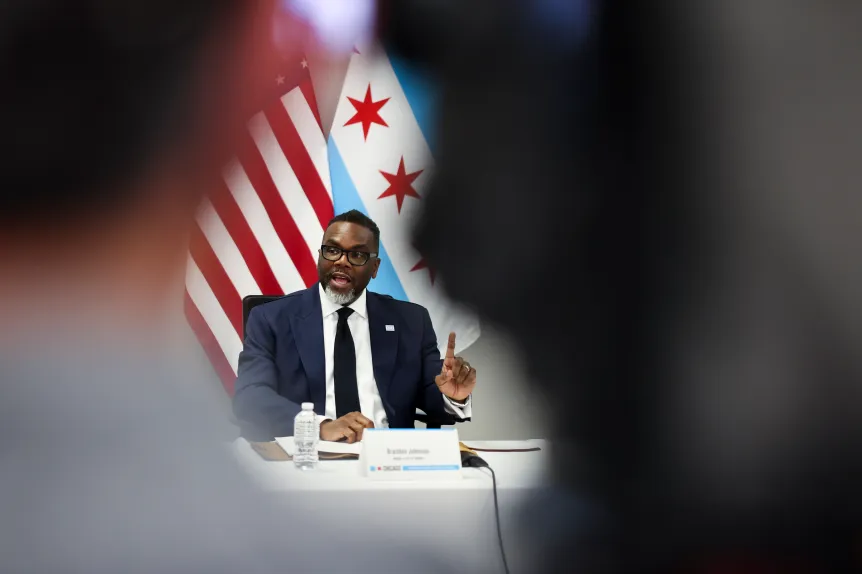In the end, the leadership of the Chicago Teachers Union accepted a contract that largely mirrored what Chicago Public Schools leadership had offered for months.
The spin, of course, from CTU and Mayor Brandon Johnson depicts this four-year labor deal as “transformative” for Chicago’s beleaguered public school system. “This is a complete transformation and a move away from school privatization, layoffs, closures,” the mayor said Tuesday at a news conference.
Hardly. A move away from layoffs and closures? For now. But the future doesn’t look bright.
The CPS bargaining team, led by CEO Pedro Martinez, agreed to add 800 to 900 new positions rather than the thousands of new union jobs CTU demanded.
CTU demanded annual raises of 9%, an absurd request but still one the union maintained over months. The union got annual raises between 4% and 5%, essentially the same amount Martinez offered last summer.
There were minor concessions regarding more preparation time for elementary school teachers and pay increases for veteran teachers at the top of the CPS wage scale. Importantly, Martinez’s team rebuffed CTU’s efforts to constrain principals from being able to run their schools.
It’s reasonable to conclude Martinez did the best he could to give CPS a fighting chance to maintain solvency over the course of this contract. But there are serious questions as to whether this deal, which will cost an estimated $1.5 billion over four years, will be affordable after the current school year ends. CPS faces a deficit of at least $500 million for the 2025-26 school year and must produce a budget by the end of August. Martinez is leaving as CEO at the end of June; next year will be his successor’s problem.
That person could be left with no choice but to resort to furlough days or layoffs to balance the books. If that comes to pass, how much talk of “transformation” will we hear? There’s nothing in this contract protecting these teachers from such future cutbacks. And the wage gains they’ve won may well make such steps more likely.
The average CPS teacher will surpass $110,000 in salary by the end of the contract. Can CPS really afford that? We’ll find out.
The current 21-member school board, made up of 10 elected members and 11 appointed by the mayor, voted last month to require Martinez’s successor to hold a school superintendent’s license. The idea is to ensure that whoever next is running the nation’s fourth-largest public school system has academic chops instead of just a financial background.
We understand the desire to focus more on what schools are supposed to do — educate children — rather than how to afford to keep them running. But given the challenges ahead, financial and budgeting expertise are likely to be at a premium. The next leader of Chicago Public Schools will confront a brutal situation thanks to a mayor who refuses to acknowledge the urgent need to rationalize a bloated system with far too many schools for the number of students it’s serving.
Speaking of the mayor, the victory lap he took on this labor deal belied reality. He boasted of being the first mayor in 15 years to secure a CTU labor pact without a strike. Given his former employment at CTU and the millions the union spent to propel him to electoral victory, averting a strike was hardly a triumph.
Not that Johnson didn’t do everything in his power to advantage CTU in these negotiations. He demanded Martinez resign last year; Martinez refused. He pressured his original school board to fire Martinez; they resigned en masse rather than do his bidding. The next board he appointed followed the mayor’s orders and fired Martinez but felt legally compelled to honor a provision in Martinez’s contract giving him six months’ notice before removal. Martinez then obtained a judge’s order barring the board from finalizing a CTU contract without his approval. That left CTU in the position of having to strike a deal with Martinez whether they liked it or not.
For Johnson, what an abdication of duty to the taxpayers of this city. Over a year ago, this page called on the mayor to recuse himself from this contract negotiation given his obvious conflict of interest. His subsequent fealty to his former employer showed exactly why he should have done so.
And the mayor has paid a significant price in his public standing for failing to stand up for taxpayers and leaving that job to Martinez, who admirably did so in the face of grossly unfair attacks, with Johnson now polling at lower levels than any mayor of Chicago before him. And CTU’s leadership has managed to take a union that rode substantial public approval to a victorious strike against Mayor Rahm Emanuel’s administration in 2012 to an approval rating below 30%.
Martinez did all he could and deserves the public’s thanks. It will be up to new leaders, on the school board and eventually at CPS headquarters, to continue to play the bad hand the unholy Johnson-CTU alliance has dealt them.


